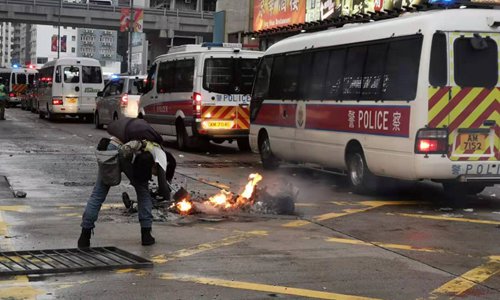HOME >> CHINA
Taiwan rejection of murder suspect unveils real ‘political purposes’
By Zhao Yusha Source:Global Times Published: 2019/10/22 0:03:39

A journalist takes pictures of a fire set by protesters in Hong Kong on Sunday. Photo: Wang Cong/GT
The Taiwan regional authority's dodging of its responsibility in a murder suspect's investigation is propelled by "political purposes," as the island's leaders fear that resolving the case might defuse unrest in Hong Kong, Chinese mainland observers said on Monday.
Taiwan's "justice chief" Tsai Ching-hsiang said Monday that the case should be prioritized for review by the Hong Kong government. The Taiwan authority would provide formal judiciary assistance to Hong Kong to resolve the case and the case would not be solved privately, Radio Taiwan International reported.
The move came after the Taiwan regional authority at the weekend rejected an attempt by Chan to turn himself into Taiwan authorities for trial and refused to grant him entry to the island.
Mainland legal experts said it was unreasonable for Taiwan to pressure Hong Kong to further investigate the case.
The case occurred on the island of Taiwan and as there's no extradition treaty between Hong Kong and the island, it was legally impossible for Hong Kong police to obtain evidence and investigate Chan, said Zhi Zhenfeng, a legal expert at the Chinese Academy of Social Sciences in Beijing.
The Hong Kong government Sunday also rejected allegations of manipulation or political motives in the decision of murder suspect Chan Tong-kai to surrender himself to Taiwan police, and said Chan's decision was made without outside influence.
Chan is wanted in Taiwan on murder charges and stands accused of killing his pregnant girlfriend during a holiday early last year.
He later returned to Hong Kong, where he was arrested and convicted of money laundering.
Chinese mainland experts said Monday that both pressuring Hong Kong authority for further investigation of the case and rejecting Chan's surrender showed the Taiwan authority had its own political purposes. The move had backfired on the island and thrown human rights into disregard.
Chan's surrender offered a special means to resolve the unresolved issue, Li Xiaobing, an expert on Hong Kong, Macao and Taiwan studies, from Nankai University in Tianjin, told the Global Times.
The surrender also cuts legal red tape and cooperation costs for Hong Kong and the island of Taiwan, Li said.
Li said nearly four months of social unrest in Hong Kong was caused by Chan's case that he believed to have triggered the extradition bill.
Hong Kong's turmoil gave the Taiwan authority many excuses to defame the "one country, two systems" principle, he said, noting that the last thing Taiwan wanted was for the chaos in Hong Kong to lose steam, and so the island's authorities would naturally strive to fuel further conflict.
Speaking on a radio program on Saturday, Hong Kong Chief Executive Carrie Lam said she hoped Chan's decision would help calm social sentiments in Hong Kong.
Zhao said the Taiwan authority fears any judicial interaction with Hong Kong may convey a signal that the island accepts "two systems," especially approaching a sensitive time of next year's regional elections.
Thus the Taiwan authority would rather risk the island's judicial impartiality to serve its selfish political purposes, the observers noted.
Chan is due to be released from prison on Wednesday. Chan will then be free in Hong Kong as the Hong Kong government and police have no rights to restrict him, Zhi noted.
"In this case, the Taiwan authority should accept his surrender, instead of refusing without legitimate reasons, he said.
Posted in: HK/MACAO/TAIWAN